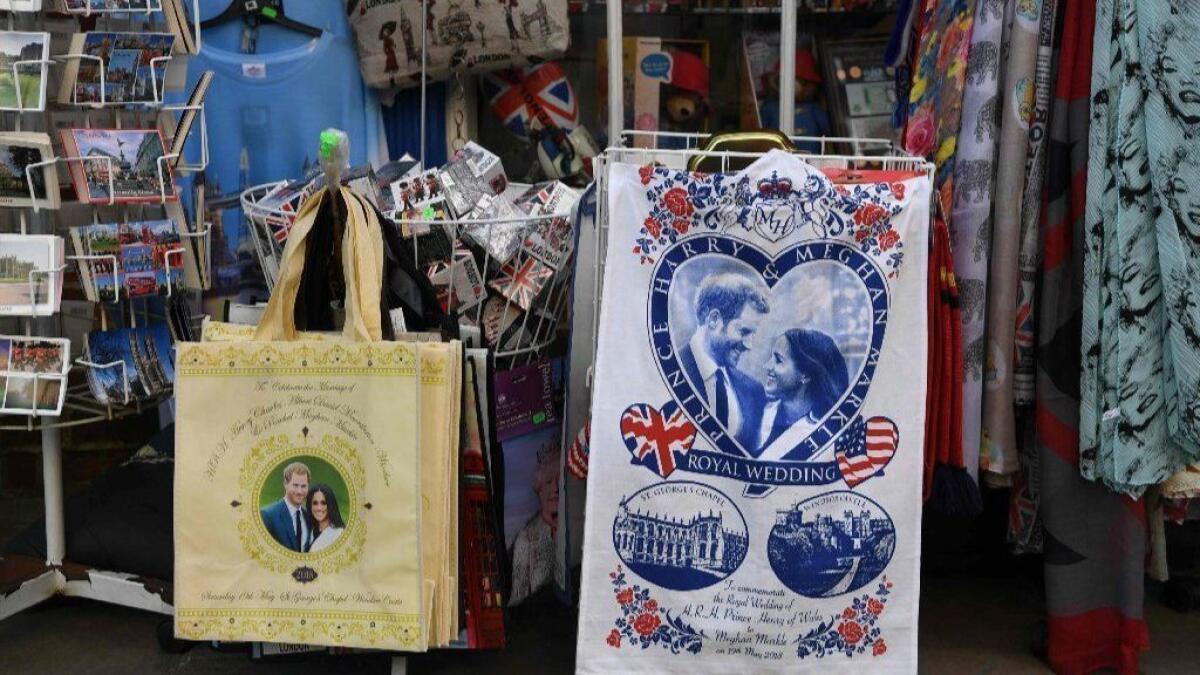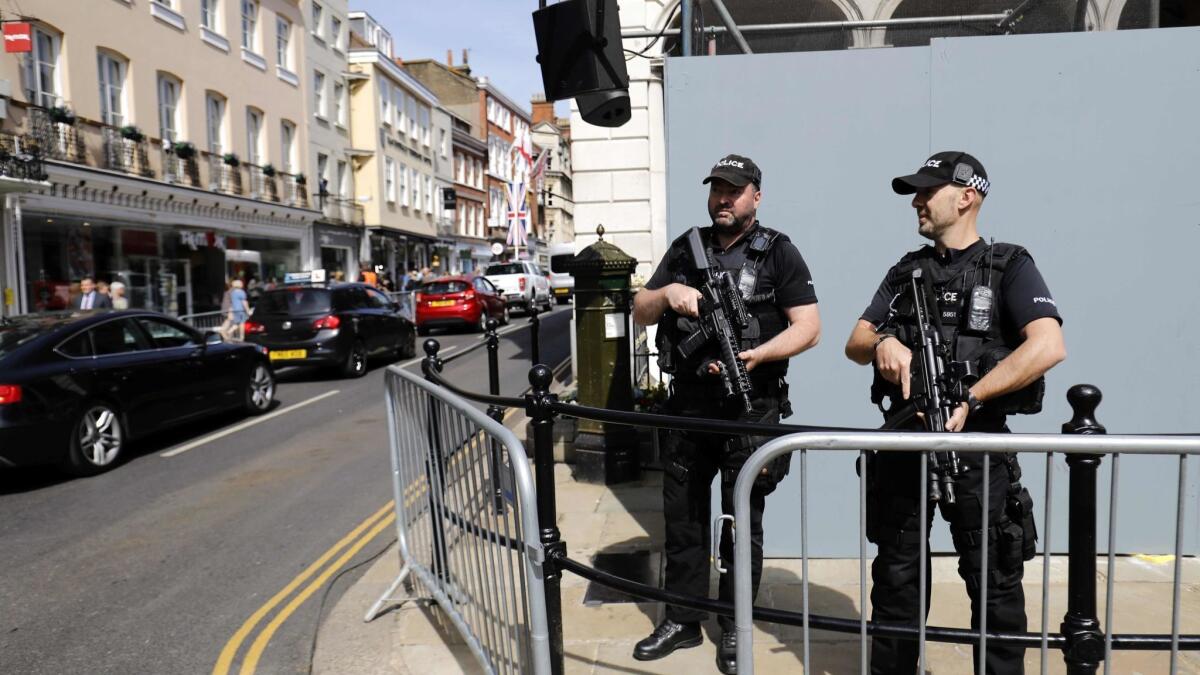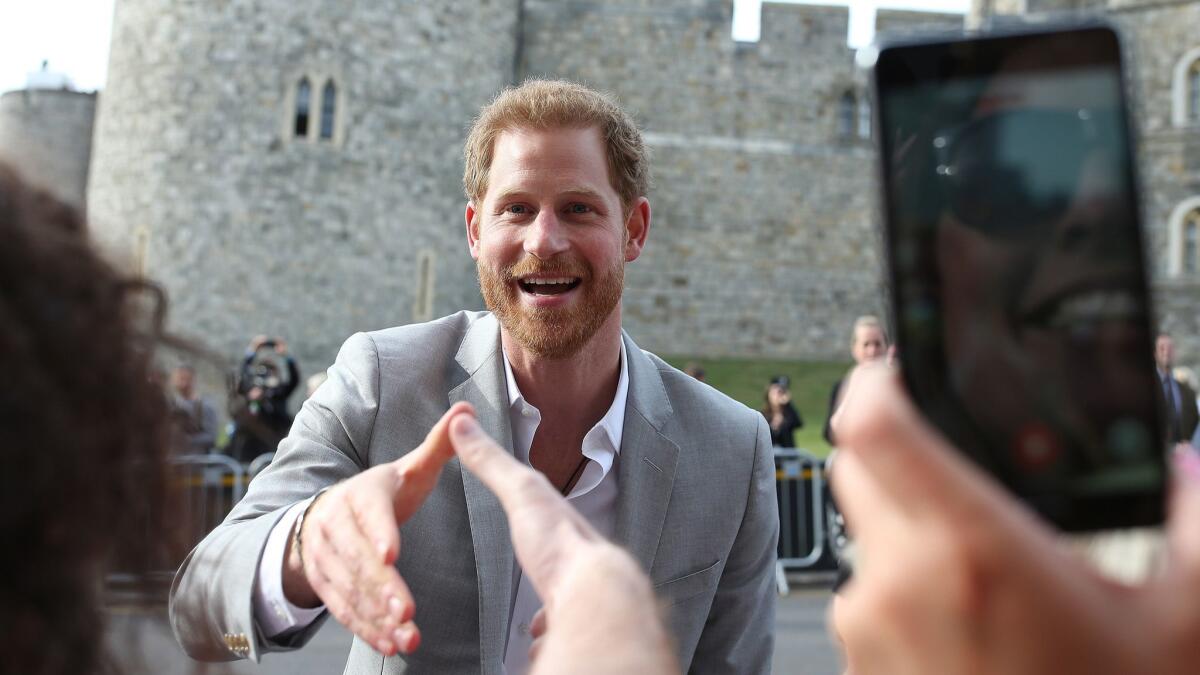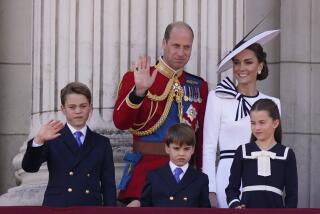Not a love match: Anti-monarchists remind Britain that not everyone adores the royal family

- Share via
Reporting from Windsor, England — How about a lovely set of Meghan-and-Harry tea towels? Mmm, no thanks. Champagne celebration in front of the telly? Pass. A jaunt to join the crowds outside Windsor Castle? Don’t think so.
It’s a lonely time to be an anti-monarchist in the United Kingdom.
As Meghan Markle and Prince Harry tie the royal knot on Saturday, polls suggest some Britons – a minority, but a substantial one, hovering in the low double digits -- would like to see the monarchy done away with altogether, though perhaps not by means as drastic as the head-lopping dispatch of a couple of Henry VIII’s recalcitrant brides.
The House of Windsor remains an enduringly popular institution, weathering storms of scandal and the near-constant perception of creeping irrelevance to survive as a national symbol – and for much of the outside world, an exemplar of British branding at its finest.
But the spectacle of a royal wedding, swooned over by so many, also serves to revive complaints that the sprawling family tree presided over by Queen Elizabeth II is rotten at its roots -- a drain on public resources, the epitome of a stiflingly unequal class system, a bizarre deviation from democratic values that Britain has historically claimed to hold dear.
The anti-monarchy movement has followers both passive and passionate. Large numbers of Britons, especially the young, are greeting this weekend’s wedding hoopla with bored nonchalance, grumbling about wall-to-wall media coverage and complaining about the cost. (Security expenses are borne by the public, with the royal family picking up the rest of what has been reported to be a $43-million tab.)

“It’s just not a big deal to me,” said Paul Winstanley, 23, who lives less than 10 miles from the wedding venue. When asked if he’d be heading to Windsor, or even watching the event on TV, he laughed.
A considerably smaller subset of royal non-enthusiasts is not merely dismissive of the wedding hype, but stands actively in opposition to the notion that a pampered and tradition-encrusted hereditary dynasty should play such an outsize role in the public life of a supposedly modern, egalitarian society.
The country’s main monarchy-abolition movement, which is called Republic and wants royals to be replaced by a directly elected head of state, is planning a pan-European gathering Saturday in London, just as the world spotlight is on the wedding at Windsor Castle. But Republic head Graham Smith said the timing is coincidental, as the conference date was announced before that of the royal nuptials.
No one is looking to rain on Meghan and Harry’s parade, Smith said — only to cast a spotlight on the monarchy’s true costs to a society that aspires to hold all as equal citizens.
“We wish the couple well, but it’s fair criticism,” he said. “It’s not about them in particular; it’s about the institution.”
Apart from a few entertainingly splenetic newspaper columns (in the Independent daily, commentator Mark Steel satirically envisioned a TV report that “around Windsor, even the flies are buzzing with a joyful air”), the anti-monarchists have kept a fairly low profile in this nuptial season. They acknowledge it might not be the most opportune moment to make their case, in part because both bride and groom are widely seen as so very ... likable.
Harry is recalled sympathetically as the boy who lost his mother, Princess Diana, at the age of 12, and has broken with tradition to speak candidly and movingly about his years-long and largely solitary struggle to cope emotionally with her death. He joins forces with a bride who is strikingly glamorous, refreshingly approachable and – at least up until now – outspoken about matters including her biracial identity and proud feminism.

The two bonded in part, friends have said, over a deep and genuine devotion to charity work. In lieu of wedding gifts, the couple asked for donations to organizations championing environmental and social causes such as women’s empowerment, veterans’ programs and helping the homeless. They’re even directing support to a group called Surfers Against Sewage.
But appealing personalities are beside the point, the monarchy abolitionists argue, even while acknowledging that Harry and Meghan -- together with elder brother Prince William, his shiny-haired wife Kate and their recently expanded brood of one little princess and two small princes -- are catnip to the public. (William and Kate’s elder children, 4-year-old George and 3-year-old Charlotte, are playing prominent roles in Saturday’s wedding, as pageboy and bridesmaid.)
Although televised images of adorable royal toddlers bearing bouquets and baskets are an extremely tough act to follow, the anti-monarchists believe that in the longer term, the temper of the times is on their side.
The royal family’s studiedly apolitical tradition, founded in the concept that a sovereign must embrace the spectrum of his or her subjects without championing any particular partisan cause, can seem out of place – and out of touch – in an era of such deeply consequential social change.
The anti-monarchists also believe that lingering devotion to things royal may be shaken by succession, whenever that comes to pass. The queen is 92. Her son and heir Prince Charles is 69.
Although the years have brought a measure of public forgiveness over the prince’s protracted and spectacularly messy 1996 split with Diana, and his marriage after her death to his longtime paramour Camilla Parker Bowles, the prospective crowning of a King Charles III excites almost no one.
The idea of a generation-skipping ascension of 35-year-old William instead has considerable traction, according to polls, but no mechanism exists for making that a reality.
And the young royals, for all their popularity, may never achieve the powerful emotional connection that many older Britons feel for Elizabeth and her late father, King George VI.
Terry Hutt is a familiarly eccentric figure on the sidelines of royal occasions. Clad in a gaudy suit of material printed with the Union Jack, he arrived in Windsor days before this weekend’s wedding to claim a prime spot on Castle Hill, a stone’s throw from a stern-looking statue of Queen Victoria that was unveiled in 1887, when she was still on the throne and Britain ruled half the globe.
At 83, Hutt calls himself a royalist of 79 years’ standing – dating back to the depths of World War II, when King George and his queen made the rounds of blitz-battered neighborhoods, offering what was then unheard-of personal consolation to their subjects.
Hutt was 4 at the time, and says he vividly remembers their visit to his own bomb-devastated neighborhood. After Buckingham Palace was itself bombed in September 1940, the future Queen Mother famously observed, referring to one of London’s hardest-hit areas, that she could at last “look the East End in the face.”
“They were with us then, one of us,” Hutt said of the royal family. “So it’s only right that we stand with them now.”
Republic’s Smith said he didn’t expect public sentiment to change overnight, but that the passing of the generational torch will likely make all the difference.
“The debate will carry on for some time,” he said. “But things can change — things will change.”
Special correspondent Christina Boyle contributed to this report from London.
ALSO:
Prince Charles will walk Meghan Markle down the aisle
At L.A.’s Immaculate Heart school, the mission is to tell the world about ‘the real Meghan’ Markle
More to Read
Sign up for Essential California
The most important California stories and recommendations in your inbox every morning.
You may occasionally receive promotional content from the Los Angeles Times.










